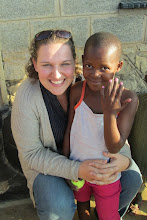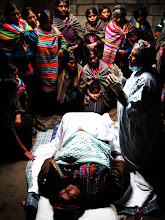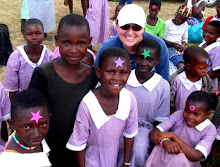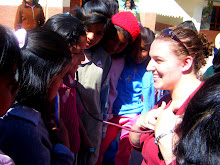I pick up the reused, 2-liter Coo-ee soda container on the floor and pour a little more water into the small, tin kettle on the gas stove. It will be my second cup of instant Nescafé coffee today. It's not particularly cold and, to be honest, the coffee isn't particularly good, but the air feels damp with rain that lingers heavy, but never falls. Plus, reading always gives me the urge to curl up with a cup of coffee, and I've been pouring over "Writing Ethnographic Fieldnotes" by Robert Emerson, et. al. for the last several hours. So I wrap my favorite Turkish, turquoise shawl- a gift from Anna- around my shoulders, as the water comes to a rolling boil. Even then, I give it an extra minute... I have no desire to give myself water-poisoning in my first 24-hours in Motete.
Cup of coffee in hand, I pull my green, folding camp-chair (Thank goodness, I thought to throw it in the pick-up truck last minute!) up just outside of the one-room house that will be my living quarters for the next three weeks. We're staying in teacher's housing at the primary school temporarily, while I look for other housing in the village... Motete is so remote and difficult to access that teachers, all of whom prefer to live in the camp towns or Capitol, must stay in-residence in the community, throughout the school term. When schools released for Christmas/summer break last week, the teachers all returned to town to spend the holidays with their families. Luckily, the Primary School Principal, Ntate Shasha, was kind enough to give us housing for the summer. So now my research assistant, Ts'episo, and my supply of food and essentials for the next several months of fieldwork, sits alongside the boxes, bags, and buckets of a female teacher who will be returning in January. The rectangular room feels cluttered; every surface covered. I have to step around hastily strewn piles of things to take the five steps from my bed to the kitchen. The ceiling is covered in a suspicious black stain that could either be the remnants of a fire, or toxic mold... Or both. But the room is big enough, I haven't seen a spider or rat yet (although, by the sound of it, there might be one living in the ceiling above me), and the spiny, wire mattress (which thankfully, removes the need for me to sleep on a pad on the floor) doesn't seem to have left me with any giant red welts from sleeping with bed-bugs last night... So, all in all, 100 Maloti (approx. $8) a week for rent, seems like a good deal. I'm grateful to Ntate Shasha for the many ways he has eased my introduction to the village over the past 24-hours- not the least of which, is making sure Ts'episo and I had a place to sleep.
Today the primary school compound is crowded with villagers. The dirt road that connects the villages of Motete and Patuoe runs directly in front of my house, not 30 feet from the rickety, wooden front-door. Now the school yard is strewn with men, women and the occasional wandering, and inevitably half-naked toddler, who escaped his mother's back. Nearly every 'Mme (mother) wraps herself tightly beneath the bust in a tjale- a light, plaid blanket worn during the day for warmth. Bo-Ntate (fathers) wear heavier, traditional likobo (blankets,) draped across their shoulders, and pinned over one arm. People huddle in small groups around the school. Bo-Mme sit alongside the walls of buildings, gossiping and trying to avoid the mid-afternoon sun or occasional bursts of light rain. Others ride up and down the road on horseback. An occasional mining vehicle from one of the three local diamond mines flies by at break-neck speed. Normally this compound would be quiet and peaceful. Today it is a hubbub of commotion and activity.
Villagers from communities across this region have come to meet the Ministry of Home Affairs officers for birth and death certificates. Normally, this process would be done in Ministry offices in each camp town, but the extravagant cost of traveling to the nearest camptown, Hlotse, (M100 each way) makes such trips a rarity for most families. Instead, the Ministry sends officials out to complete the paperwork process in remote mountain communities, such as this.
The villagers began arriving at 6am this morning; around the same time that Ntate Shasha koko-ed at my door to introduce me to the brother of the Morena (Chief) of Motete, Ntate Mopeli. Now, at nearly 3pm, more than 100 people have gathered, but the Ministry has yet to arrive. Villagers, many with hours of walking ahead of them, begin to disperse. After a full day of waiting, they patiently return home without the legal papers they require. They are told to come back tomorrow; hopefully the Ministry will arrive then.
As people slowly dissipate and walk past my front door, I am the focus of many states and much intrigue. It's attention I am used to but now, as an ethnographer who needs to gain the trust of the community, my awareness of my own responses/reactions is heightened. Despite the discomforting looks from every pedestrian, I sit in plain view and meet their uncomfortable stares with a constant smile and endless waves and greetings. "Be accessible and approachable," I silently remind myself. At the mere sign of acknowledgement, most of the women break into delighted smiles, eagerly greeting me back in Sesotho. They seem surprised at my openness and acknowledgement- perhaps a little surprised at my Sesotho. I feel a little swell of pride at this repetitive minuscule success. It hardly counts as "breaking the ice," but for an introvert- someone who prefers silence and solitude, most of the time- being this forward and publicly exposed feels uncomfortable. I resist my natural instinct to take my coffee and book back inside; eventually my self-exposure is rewarded. Over time, I feel more comfortable in my own skin... And the community likewise, takes one small step towards being more comfortable with me in return.
As the school compound slowly empties, and the sun starts to slip behind the mountains that shadow Motete on both sides of the valley, a group of five young women arrive in the field across the dirt road from me. They carry reused plastic bags. Slowly, almost lazily, chattering as they work, they bend over at the waist and begin picking wild morroho (spinach) out on the tangle of plants at their feet. Every once in a while, one girl will look up in my direction and make eye-contact with me. She makes a comment to her friends, eliciting embarrassed glances in my direction from the entire group, followed by nervous giggles. I can't help but chuckle; I am an endless source of amusement, even when I'm doing absolutely nothing of interest.
I could sit here and continue to type this blogpost, or I could return to my book... But opportunities like this are what I came here for. It's my first day of fieldwork, and I can already tell that this experience will stretch me in new ways personally and professionally. This work will force me to be proactive in forging relationships. I won't be successful if I don't earns the trust of the women I hope to learn from, and I certainly can't build those relationships from the comfort and security of this camp-chair. So instead, I'll lean into the discomfort once again; I'll be vulnerable and ask for help. I'll use Sesotho, even though the laughter of others occasionally makes me feel self-conscious and uncomfortable. I'll get up and go join the giggling, nervous young women in the field. I'll ask them to teach me to identify poisonous weeds from edible plants... Because this is what I came here for. And maybe, if I succeed, Ts'episo and I will even be eating wild greens for dinner.
With love from Motete... Mary E.
Subscribe to:
Post Comments (Atom)






No comments:
Post a Comment